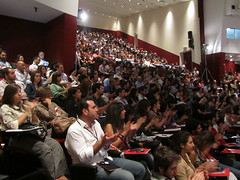Just like in writing, in blogging, you need to know your audience. In writing, sometimes it’s enough to know the reader expectations within your genre. In blogging, sometimes it can be enough to know your niche.
Last week, we talked about finding that blog niche, whether you center your blog around writing, your research interests, or your hilarious life. But no matter what your topic is, it’s really important to keep in mind who you expect to read your blog.
If it’s just your mom and a couple friends—woot! You’re set! But if you’re hoping to garner publication  title=”audience clapping” class=”alignright” width=”240″ height=”180″ />attention or be taken seriously as a writer by other industry professionals, to keep your readers reading to or build up your platform, it’s important to recognize those goals, and then figure out how to build on them.
title=”audience clapping” class=”alignright” width=”240″ height=”180″ />attention or be taken seriously as a writer by other industry professionals, to keep your readers reading to or build up your platform, it’s important to recognize those goals, and then figure out how to build on them.
Let me just tell you: the odds of your website or blog attracting a publication offer all on its own are pretty dang low. (Though I have heard of editors requesting books based on website blurbs.) All the same, you want to make sure your website/blog showcases your writing (if you think you’re ready for primetime) as well as you. That professionalism is key no matter what your goal with a writers’ blog is.
But beyond being professional and showing off you and your writing, the goals for your blog help you determine what to blog about and who to blog for. For example, if you’re blogging to build up your platform (for nonfiction, we’ll say), you’ll want to blog as an authority on your chosen topic. You’ll want to look for guest post opportunities at other blogs in the industry/market as well as invite other authorities. Your blog audience, most likely, is going to be your potential customers: people who currently have the problem your book solves.
As another example, let’s say you’re blogging to keep readers reading. You’re published, but you’re using your blog to connect with your readers. There are a lot of ways to do this, whether that’s blogging about your life and events in the same tone as your books, or posting short pieces in the same genre, or just looking to connect with your readers on a personal level. And of course you’ll want news on your upcoming books.
As Roni Loren reminded us last week, readers are a niche, and that niche centers around books. You can talk about others’ books, you can talk about the writing process, you can talk about your research—but remember why your blog readers are there. It’s because they like your books, and then maybe also you.
Connecting with your readers: building a blog community
borrowed a bit from one of my other blogs
I’ve watched many a blog rise and fall, with hundreds or even thousands of readers. I interviewed a couple friends (who are no longer actively blogging) to take a look at how they build up their blog communities.
 From Michelle at Scribbit:
From Michelle at Scribbit:
- Commenting on other’s posts is the best way to build community–but beyond that choosing topics is the most important.
- Choose topics that are relevant to your readers. Put yourself in their shoes and think about what you’d want to read.
- Paying attention to other people’s posts and then responding to them in a post of your own is a good way to promote discussion and build community.
From MommyZabs:
- I believe that if you desire people to comment on your blog and see your comment numbers going down (over a period of time, not just one post) you need to make sure you haven’t given off signals that you don’t want others’ input. The easiest way to remedy that is to invite opinions, comments.
- Pay attention to the types of post content that gets people talking, make sure to commit to that type of post regularly.
- Write posts relevant to your readership. [Hm. Notice a trend?]
- Talk back, respond. No one likes to talk to someone who just stares back. That is what it can feel like when you put yourself out there on a blog comment and know one acknowledges you.
- Post on a regular basis. This is important for 2 major reasons.
- The more people see something the more it is on the front of their mind. If they are coming to read your blog daily because you post daily, it is less likely to creep toward the back of their mind.
- Let’s face it, though feed readers are an excellent way to track the blogs you read, there are still those that don’t use it! If they click day after day and barely see a post, chances are they will stop coming.
From me:
 I think it’s also good to let your readers know how they can connect with you. A blog community doesn’t just have to stay on one site—and neither do your friends!
I think it’s also good to let your readers know how they can connect with you. A blog community doesn’t just have to stay on one site—and neither do your friends!
You can help to encourage more comments on your blog by asking questions in your posts, looking for more input, and giving your readers a chance to help assemble the whole, to comment and connect.
If my blogs are an indicator, blog comments have taken a dramatic nose-dive in the last couple years, and I certainly don’t have all the answers. So I’d love to hear what you think!
What bloggers do you think have great communities? What have you seen those bloggers do to reach out to their readers? Who is your blog audience?
Photo credits: audience—ThinkMedia Labs; plug—Rennett Stowe; clasp—Bao Ngo


They’re the ones that I feel I can connect with. I used to comment back within the comments, but I read somewhere that few people go back to see if you commented there, so I either email them back or visit their blogs.
I think it’s good to do it both ways—email and on the blog. That way you’ll be able to continue the conversation with that person, as well as have others see the conversation in case they want to join in.
Your comment inspired me to look into ways to do this in WordPress and I found several plugins to email commentators when a reply is left to one of their comments. Cool!